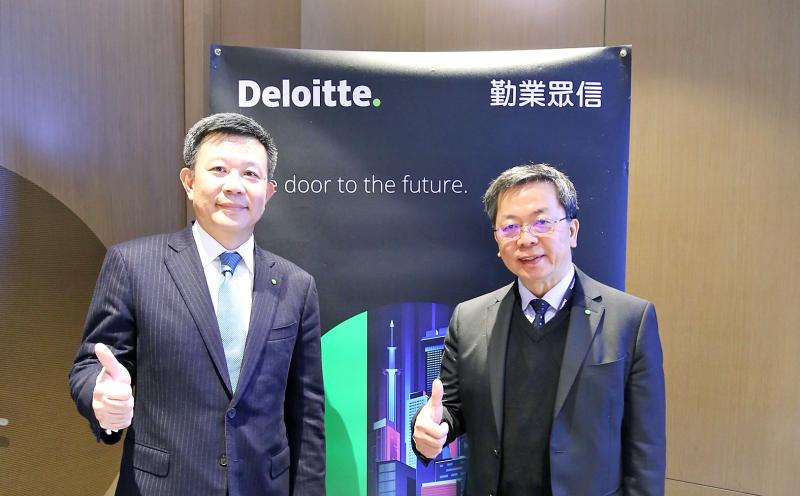The number of initial public offerings (IPO) this year might total 60, with the amount of capital raised likely to reach NT$24 billion (US$842.67 million), as the local bourse gains traction amid an improving global economy, Deloitte Taiwan said yesterday.
The projected number of IPOs would be a more than twofold improvement on last year’s decade low of 29, as the COVID-19 pandemic dampened corporate confidence and pushed back IPO activity, Deloitte Taiwan managing partner Kenny Hong (洪國田) said.
“The number of IPO deals last year could have reached 50 if there had been no virus outbreak and no US-China trade tensions,” Hong told a news conference in Taipei on the development and outlook of the local capital market.

Photo courtesy of Deloitte Taiwan
This year, 31 firms have filed applications, while last year’s 29 firms have raised NT$14.7 billion in funding, a 50 percent decline from 2019, Hong said.
However, this meant that individual firms raised NT$500 million to NT$800 million, better than the three-year average from 2016 to 2018, Hong said.
Monetary easing by major central banks worldwide is favorable for capital markets, including the TAIEX, which was ranked third globally in terms of dividend payouts, Deloitte Taiwan said.
An ongoing rally on the local bourse would support fund-raising activity by elevating price-to-earnings ratios for many firms, TAIEX data indicated.
Share prices in Taiwan Semiconductor Manufacturing Co (台積電), the world’s largest contract chipmaker, surged more than 60 percent last year, while United Microelectronics Corp (聯電), the world’s No. 4 contract chipmaker, more than doubled.
Tech dominated the local IPO market last year, but Pan German Universal Motors Ltd (汎德永業汽車), which distributes BMW, Porsche and Mini vehicles locally, finished first by raising NT$2.3 billion, accounting for 16 percent of the total capital raised, Deloitte Taiwan said.
Proximity sensor maker Sensortek Technology Corp (昇佳電子) emerged a close second with NT$2.14 billion, accounting for 15 percent, it added.
Deloitte Taiwan expects tech firms to be the main participants this year, as Taiwan is home to the world’s major contract electronics suppliers, Hong said, adding that several companies have already filed listing applications and are due to make a debut later this year.
Local companies assign more importance to their environmental, social and governance awareness and showings, in line with an evident global trend, as earning ability can no longer be the sole measure of a good company, Hong said.
US-China trade tensions would continue to shape the global economic landscape and all eyes are focused on how US president-elect Joe Biden would handle the dispute, Deloitte Taiwan chief executive officer Casey Lai (賴冠仲) said.

TAKING STOCK: A Taiwanese cookware firm in Vietnam urged customers to assess inventory or place orders early so shipments can reach the US while tariffs are paused Taiwanese businesses in Vietnam are exploring alternatives after the White House imposed a 46 percent import duty on Vietnamese goods, following US President Donald Trump’s announcement of “reciprocal” tariffs on the US’ trading partners. Lo Shih-liang (羅世良), chairman of Brico Industry Co (裕茂工業), a Taiwanese company that manufactures cast iron cookware and stove components in Vietnam, said that more than 40 percent of his business was tied to the US market, describing the constant US policy shifts as an emotional roller coaster. “I work during the day and stay up all night watching the news. I’ve been following US news until 3am

UNCERTAINTY: Innolux activated a stringent supply chain management mechanism, as it did during the COVID-19 pandemic, to ensure optimal inventory levels for customers Flat-panel display makers AUO Corp (友達) and Innolux Corp (群創) yesterday said that about 12 to 20 percent of their display business is at risk of potential US tariffs and that they would relocate production or shipment destinations to mitigate the levies’ effects. US tariffs would have a direct impact of US$200 million on AUO’s revenue, company chairman Paul Peng (彭雙浪) told reporters on the sidelines of the Touch Taiwan trade show in Taipei yesterday. That would make up about 12 percent of the company’s overall revenue. To cope with the tariff uncertainty, AUO plans to allocate its production to manufacturing facilities in

Six years ago, LVMH’s billionaire CEO Bernard Arnault and US President Donald Trump cut the blue ribbon on a factory in rural Texas that would make designer handbags for Louis Vuitton, one of the world’s best-known luxury brands. However, since the high-profile opening, the factory has faced a host of problems limiting production, 11 former Louis Vuitton employees said. The site has consistently ranked among the worst-performing for Louis Vuitton globally, “significantly” underperforming other facilities, said three former Louis Vuitton workers and a senior industry source, who cited internal rankings shared with staff. The plant’s problems — which have not

TARIFF CONCERNS: The chipmaker cited global uncertainty from US tariffs and a weakening economic outlook, but said its Singapore expansion remains on track Vanguard International Semiconductor Corp (世界先進), a foundry service provider specializing in producing power management and display driver chips, yesterday withdrew its full-year revenue projection of moderate growth for this year, as escalating US tariff tensions raised uncertainty and concern about a potential economic recession. The Hsinchu-based chipmaker in February said revenues this year would grow mildly from last year based on improving supply chain inventory levels and market demand. At the time, it also anticipated gradual quarter revenue growth. However, the US’ sweeping tariff policy has upended the industry’s supply chains and weakened economic prospects for the world economy, it said. “Now